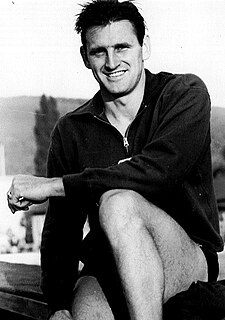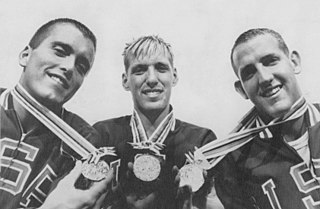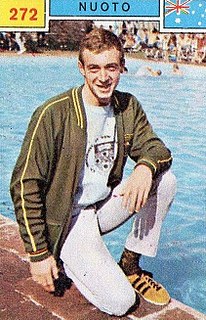
The men's 200 metre freestyle event at the 2004 Summer Olympics was contested at the Olympic Aquatic Centre of the Athens Olympic Sports Complex in Athens, Greece. The event took place on 15 and 16 August. There were 59 competitors from 53 nations, with each nation having up to two swimmers.

The men's 100 metre freestyle event at the 1976 Summer Olympics took place between July 24 and 25. This was the first time in history that the 100m freestyle was swum under 50 seconds. There were 41 competitors from 27 nations. Nations had been limited to three swimmers each since the 1924 Games. The event was won by Jim Montgomery of the United States, the nation's second consecutive and tenth overall victory in the men's 100 metre freestyle. His countryman Jack Babashoff took silver. Peter Nocke's bronze was the first medal for West Germany in the event, though the United Team of Germany had won a bronze in 1964.

The men's 200 metre breaststroke was one of 6 swimming events on the Swimming at the 1908 Summer Olympics programme. It was the only breaststroke event on the schedule. 1908 was the first appearance of the 200 metre breaststroke, as 1904 had seen the introduction of the stroke to Olympic competition with the 440 yard event. Each nation could enter up to 12 swimmers.

The men's 100 metre freestyle event at the 1980 Summer Olympics was held on 26 and 27 July at the Swimming Pool at the Olimpiysky Sports Complex. There were 39 competitors from 26 nations. Nations had been limited to three swimmers each since the 1924 Games. The event was won by Jörg Woithe of East Germany, the nation's first medal in the men's 100 metre freestyle. Sweden earned its first medals in the event since 1952 with Per Holmertz's silver and Per Johansson's bronze.
The men's 200 metre breaststroke was a swimming event held as part of the swimming at the 1920 Summer Olympics programme. It was the third appearance of the event.
The men's 200 metre breaststroke was a swimming event held as part of the swimming at the 1924 Summer Olympics programme. It was the fourth appearance of the event, which was established in 1908. The competition was held on Tuesday July 15, 1924, on Wednesday July 16, 1924, and on Thursday July 17, 1924.
The men's 200 metre breaststroke was a swimming event held as part of the swimming at the 1932 Summer Olympics programme. It was the sixth appearance of the event, which was established in 1908. The competition was held from Thursday August 11, 1932 to Saturday August 13, 1932.
The men's 200 metre breaststroke was a swimming event held as part of the swimming at the 1936 Summer Olympics programme. It was the seventh appearance of the event, which was established in 1908. The competition was held from Thursday to Saturday, 13 to 15 August 1936.

The men's 100 metre freestyle event at the 1948 Olympic Games took place between 30 and 31 July at the Empire Pool. There were 41 competitors from 19 nations. Nations had been limited to three swimmers each since the 1924 Games. The event was won by Wally Ris, returning the United States to the podium in the event after a one-Games absence broke a seven-Games streak. It was the sixth victory for an American in the 100 metre freestyle, most of any nation. Another American, Alan Ford, took silver. Géza Kádas of Hungary earned bronze, the nation's third medal in four Games. Japan's three-Games medal streak in the event ended with no Japanese swimmers competing due to the nation not being invited after World War II.

The women's 200 metre breaststroke event, included in the swimming competition at the 1948 Summer Olympics, took place from 30 July to 3 August at the Empire Pool. In this event, swimmers covered four lengths of the 50-metre (160 ft) Olympic-sized pool employing the breaststroke. It was the fifth appearance of the event, which first appeared at the 1924 Summer Olympics in Paris. It was also the first appearance of the event since the outbreak of World War II. A total of 22 competitors from 14 nations participated in the event.

The men's 100 metre freestyle event at the 1952 Summer Olympics took place between 26 and 27 July at the Helsinki Swimming Stadium. There were 61 competitors from 33 nations. Nations had been limited to three swimmers each since the 1924 Games. The event was won by Clarke Scholes of the United States, the nation's second consecutive and seventh overall victory in the men's 100 metre freestyle. Japan, absent from the 1948 Games after World War II, returned to the podium in the event with Hiroshi Suzuki's silver. Göran Larsson earned Sweden's first medal in the event since 1908 with his bronze.
The women's 400 metre freestyle event at the 1952 Olympic Games took place between 31 July and 2 August at the Swimming Stadium. This swimming event used freestyle swimming, which means that the method of the stroke is not regulated. Nearly all swimmers use the front crawl or a variant of that stroke. Because an Olympic size swimming pool is 50 metres long, this race consisted of sixteen lengths of the pool.

The men's 100 metre freestyle event at the 1956 Olympic Games took place between 29 and 30 November. There were 34 competitors from 19 nations. Nations had been limited to three swimmers each since the 1924 Games. The event was won by Jon Henricks of Australia, the nation's first medal in the event. Australia would win a second 0.4 seconds later and a third 0.9 seconds after that, sweeping the podium—the first sweep in the men's 100 metre freestyle since the United States did it in 1920 and 1924, and the first sweep of any event by Australian competitors. This year, the Americans finished fourth through sixth. It was the first time since 1924 that Japan had competed but not medaled.

The men's 100 metre freestyle event at the 1960 Olympic Games took place between August 26 and 27. There were 51 competitors from 34 nations. Nations were limited to two swimmers each, down from three in previous Games. The event was won by John Devitt of Australia over Lance Larson of the United States in a controversial, disputed finish that resulted in a push for electronic timing. It was Australia's second consecutive victory in the event, third-most all-time behind the United States' 7 gold medals and Hungary's 3. Devitt, silver medalist four years earlier, was the fifth man to win multiple medals in the event. Manuel dos Santos earned Brazil's first medal in the men's 100 metre freestyle with his bronze.
The men's 200 metre breaststroke event at the 1960 Olympic Games took place between August 26 and August 30. This swimming event used the breaststroke. Because an Olympic size swimming pool is 50 metres long, this race consisted of four lengths of the pool.
The women's 100 metre freestyle event at the 1960 Olympic Games took place between August 26 and 29. This swimming event used freestyle swimming, which means that the method of the stroke is not regulated. Nearly all swimmers use the front crawl or a variant of that stroke. Because an Olympic-size swimming pool is 50 metres long, this race consisted of two lengths of the pool.

The men's 100 metre freestyle event at the 1964 Olympic Games took place between October 11 and 12. There were 66 competitors from 33 nations. Nations were again able to bring up to three swimmers each after a one-Games limit of two in 1960. The event was won by Don Schollander of the United States, the nation's first victory in the event since 1952 and eighth overall. Great Britain and the United Team of Germany both earned their first medal in the men's 100 metre freestyle.

The men's 200 metre backstroke event at the 1964 Summer Olympics took place between October 11 and 13. There were 34 competitors from 21 nations, with each nation having up to 3 swimmers. The medals were swept by the United States, with Jed Graef, Gary Dilley, and Bob Bennett taking gold, silver, and bronze respectively.

The men's 100 metre freestyle event at the 1968 Olympic Games took place between 18 and 19 October. There were 64 competitors from 34 nations. Nations had been limited to three swimmers each since the 1924 Games. The event was won by Michael Wenden of Australia, the nation's third victory in four Games. Americans Ken Walsh and Mark Spitz took silver and bronze, respectively.

The men's 100 metre freestyle event at the 1972 Olympic Games took place between September 2 and 3. There were 48 competitors from 29 nations. Nations had been limited to three swimmers each since the 1924 Games. The event was won by Mark Spitz of the United States, his then-record sixth gold medal in a single Games. It was the ninth victory in the event for an American, most of any nation. Jerry Heidenreich, also of the United States, took silver. Soviet swimmer Vladimir Bure earned bronze, the nation's first medal in the men's 100 metre freestyle.













